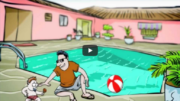The following are excerpts from Nick Shriver’s trip to Peru where he represented both the United States Lifesaving Association and the International Lifesaving Federation at a Seminar and competition.
Nick is from the Northwest Region of USLA and regularly attends the bi-annual meetings. He has made significant contributions to the Public Education Committee, the Junior Lifeguard Committee, and others. Nick spent his own time and money to help out. From what I gather, the president of the Peruvian Lifeguarding Association was very impressed with Nick and the information he shared with our lifesaving brothers and sisters in Peru. Nick even won the physical competition on the last day!
Due in large part to Nick’s actions and personal contact with lifeguards in the area, the ASP has now submitted an application to join ILS as a corresponding member. The application will be reviewed by the board in September 2006.
It is through the selfless actions of people like Nick, who put the needs of others ahead of his own, that worldwide lifesaving is advancing paso por paso (step by step). Thank you Nick!
After 35 years nobody in Peru has formed a lifesaving team to prepare Peru for natural disasters such as earthquakes, tsunamis, and floods. With the probability of these natural disasters occurring, it’s vital to have lifeguards prepared to assist as part of Peru’s emergency response resources.
The Peruvian Lifeguard Association (ASP, initials in Spanish) has 17 years standing with 403 members from Peru. Members are from various backgrounds, including: fire fighters, police officers, Red Cross volunteers, civil defence soldiers, teachers, divers, and military personnel.
The first ever International Lifesaving and Water Rescue Seminar for Emergency Situations held in Lima, Peru, December 15-17, 2005. It was dedicated to the advancement of the ASP. The ASP, in turn, learned new rescue techniques, developed emergency procedures for natural disasters, and introduced new safety practices through the collaboration and exchange of ideas form different experts in the field of lifesaving. One of the basic ideas shared was the problem that lifeguards are in demand; and that every good swimmer should be a lifeguard.
Being the only international representative my goal was to share as many ideas and techniques as possible through presentations, instruction, demonstrations, evaluating current standards, making recommendations, and sharing resources of information. One of my goals was to get ASP to see the importance of joining the International Lifesaving Federation (ILS).
The first day consisted of discussion and expositions. Speakers included experts in the field in lifesaving, including: ASP’s President who inaugurated the seminar (Captain Luis Hermoza), a nurse, a psychologist, a civil defence representative, and me an United States Lifeguard Association (USLA) and East Bay Regional Park District/Aquatics (EBRPD) representative; all shared information, ideas, and answered questions. I shared basic information such as preventive life guarding strategies, preventing disease transmission, and rescue techniques.
The second day took place at the Rimac River in Lima and was spent practicing and certifying lifeguards in river rescue. The basic techniques taught was having the ability to cross the river using a rope and buoy and being able to rescue a victim caught in the river. After the river rescue practice the rest of the day was spent at the National Stadium’s pool where the participants were evaluated. All participants successfully demonstrated their ability to make rescues. The only thing that lacked from the program was rescue equipment. Basic rescue equipment such as rescue tubes/cans, rescue boards, fins, and disposable gloves/pocket masks were missing. The most important step for ASP would be to acquire such equipment.
The third day was spent at beach in Lima known as “Aguas Dulces. The day’s topics included boat rescues, rescue dogs, and a grand finale of a lifeguard competition.
The seminar was concluded with an award ceremony and closing banquet at the host hotel, awarding certificates to all participants.
ASP plans to continue evolving by joining the ILS and hosting another seminar in 2006. The seminar will include an educational conference, rescue simulations, and a lifeguard competition with ILS events. ASP would like to learn more about first aid and modern equipment practices along with hopes of one day hosting an ILS competition. There is a lot of work to be done in Peru and the opportunities are endless. This is a good example of the evolution of lifesaving on a global level and that the advancement of lifesaving is a global issue.


